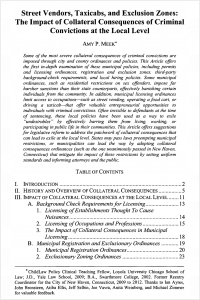Street Vendors, Taxicabs, and Exclusion Zones: The Impact of Collateral Consequences of Criminal Convictions at the Local Level
Amy P. Meek, 75 Ohio State Law Journal 1
According to the article's author, some of the most severe collateral consequences of criminal convictions are imposed through city and county ordinances and policies. This article offers the first (at the time) in-depth examination of these municipal policies, including permits and licensing ordinances, registration and exclusion zones, third-party background-check requirements, and local hiring policies. The author contends that some municipal ordinances, such as residential restrictions on sex offenders, impose far harsher sanctions than their state counterparts, effectively banishing certain individuals from the community. In addition, municipal licensing ordinances limit access to occupations-such as street vending, operating a food cart, or driving a taxicab-that offer valuable entrepreneurial opportunities to individuals with criminal convictions. Often invisible to defendants at the time of sentencing, these local policies, says the author, have been used as a way to exile "undesirables" by effectively barring them from living, working, or participating in public life in their communities.
This article offers suggestions for legislative reform to address the patchwork of collateral consequences that can lead to exile at the local level. States may pass laws preempting municipal restrictions, or municipalities can lead the way by adopting collateral consequences ordinances (such as the one unanimously passed in New Haven, Connecticut) that mitigate the impact of these restrictions by setting uniform standards and informing attorneys and the public.
